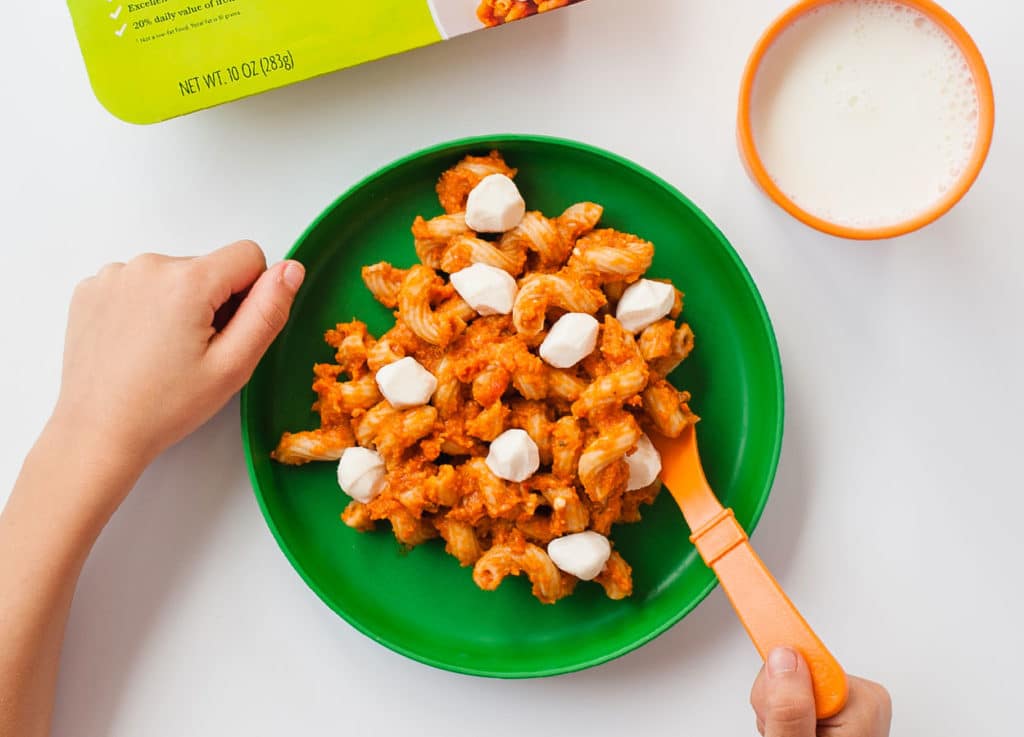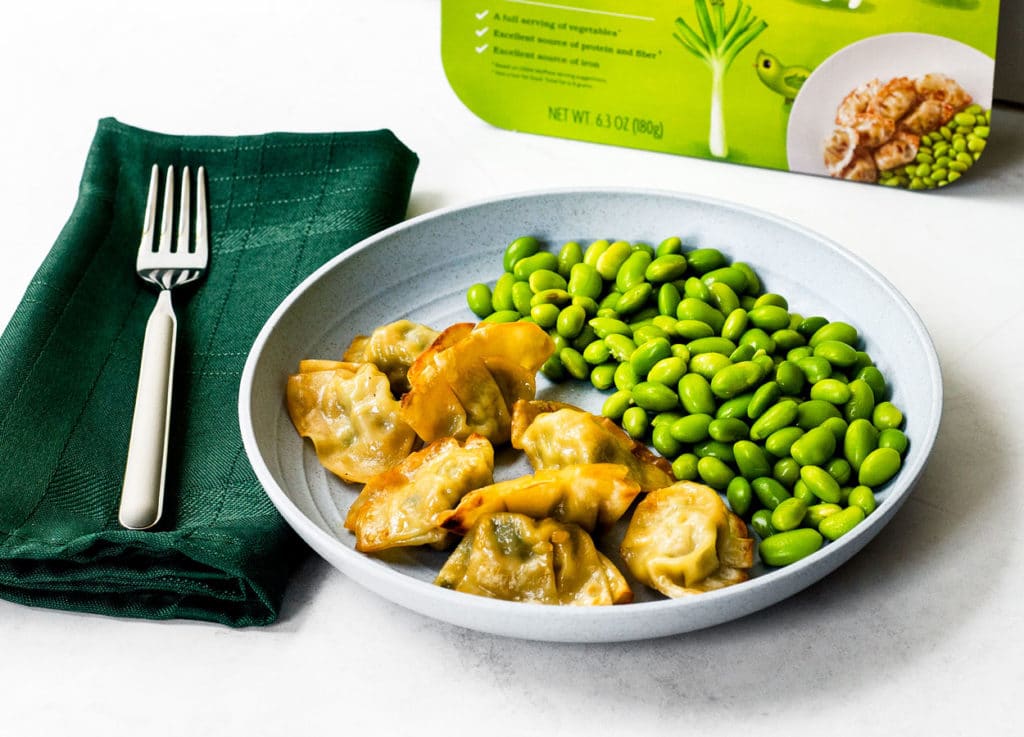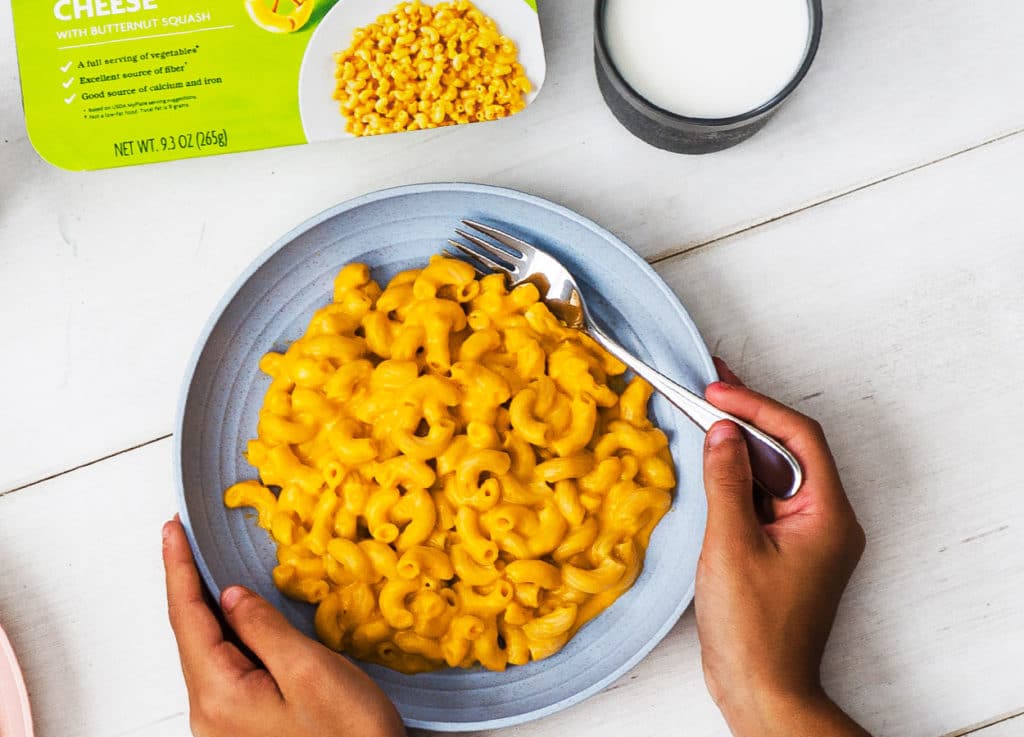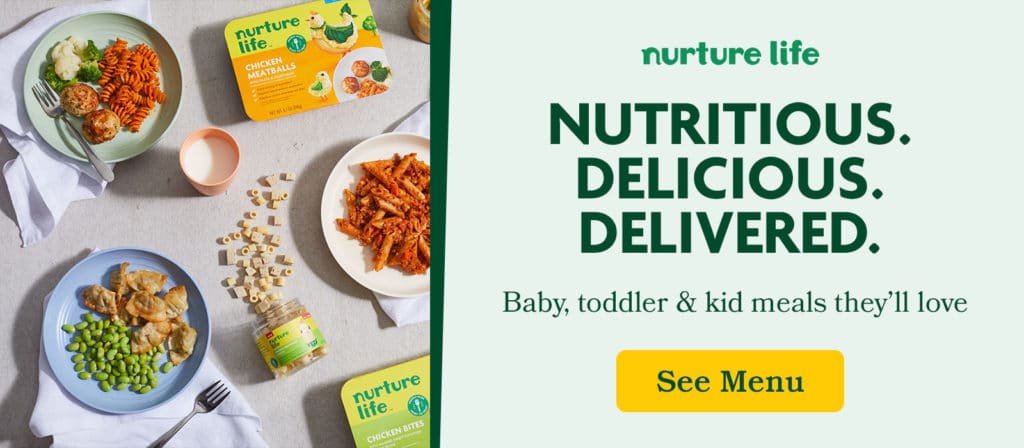Healthy, Plant-Based Protein Meal Ideas for Kids
Whether or not your family follows a strictly vegetarian or vegan diet, there’s always room for more veggies on the plate! Especially for active and growing kids, plant-based protein sources are rich in essential nutrients and tend to be a very good source of dietary fiber.
If you’d like to incorporate more veggie goodness into your healthy family meals, we’re sharing some of our favorite ideas for veggie-forward and fully vegetarian meals for kids. Your kids will see that protein doesn’t have to mean meat!
12 High-Protein, Veggie-Focused Meals for Kids
Plant-based can mean a variety of things from vegan, to vegetarian, to simply including more plants including legumes, nuts, seeds, and whole grains. Below, we’re providing nutritious meal ideas to fit all categories, broken down by their primary plant-based protein source.
Legume-Based Protein Ideas

Also known as “pulses,” legumes are seeds or pods. Common legumes include chickpeas, black beans, green peas and lentils. Try out some of these legume-rich meals for kids:
- Five-Ingredient Veggie Burgers: These quick veggie burgers are made from canned black beans and rolled oats, and the recipe’s spice recommendations can be easily substituted with your kids’ favorite herbs, seasonings or sauces.
- Veggie Ragout Pasta with Fresh Mozzarella: A warm bowl of Italian-style pasta is always a hit with kids! Nurture Life’s signature red sauce has lentils smoothly blended in for a plant-based pop of fiber, vitamins and minerals.
- Slow Cooker Vegetable Bean Soup: This vegan soup features a hearty serving of Great Northern beans along with classic soup veggies like carrots and celery. Just toss the ingredients together and let the slow cooker work its magic.
Why Legumes?
Legumes are low in fat and high in protein, and most legumes are rich in folate and dietary fiber. Studies have shown that regular consumption of legumes may lower cholesterol, improve blood pressure management and reduce the risk of developing Type 2 diabetes.
Soy-Based Protein Ideas

Soybeans are technically a legume, but as far as plant-based proteins go, soy is truly in a class of its own! Popular preparations include boiled soybeans (edamame), firm or soft tofu and tempeh nuggets or slices. Here are some delicious ways to serve this versatile protein:
- Baked Tofu Nuggets: A delightfully kid-friendly introduction to tofu, these vegan nuggets are made from extra-firm tofu dipped in almond milk and breadcrumbs and then baked to the perfect crisp.
- Garlic Teriyaki Tempeh: This vegan meal is your classic beef and broccoli without the beef! It serves up a full serving of protein and veggies, along with extra fiber from brown rice on the side.
- Chicken & Vegetable Dumplings with Edamame: Our little dumplings are a great way to incorporate plant-based protein without going fully vegetarian. Our dumplings are packed with chicken and tofu and come with a side of pop-in-your-mouth edamame—giving your kids two servings of soy in one!
Why Soy?
Unlike most plant-based protein sources, soybeans contain all nine amino acids that are essential for human nutrition. In nutritional terms, that makes soy a “complete” protein. Studies have also shown that soy may stimulate the growth of healthy bacteria in the gut, especially in the colon.
Whole Grain-Based Protein Ideas

By replacing your kids’ favorite refined grains with whole grains, you can easily increase their intake of dietary fiber and plant-based protein. To help picky eaters transition, we recommend mixing the accepted refined grain (like white rice) with the new whole grain (like brown rice) and then slowly adjusting the ratio over time. You can try this method with any of these whole grain-focused meal ideas:
- Quinoa Chili: This vegetarian chili not only includes quinoa but also black beans and kidney beans for a triple serving of whole grain- and legume-based protein. Although this chili has quite a few ingredients, you can throw them all in a pot to stew for a fairly hassle-free prep.
- Wild Rice and Broccoli Casserole: This one-pan meal is a deliciously cheesy take on vegetarian protein. The wild rice blend is balanced with spinach and broccoli for a colorful, nutrient-rich bite. Can’t find wild rice? Consider swapping in another whole grain alternative like farro or buckwheat!
- Mac & Cheese with Butternut Squash: Our Mac & Cheese features whole wheat pasta tossed in a creamy four-cheese sauce with smoothly pureed organic butternut squash. It’s one of our all-time favorite picky eater meals!
Why Whole Grains?
Whole grains are packed with many essential nutrients, especially B vitamins and dietary fiber. According to researchers, whole grains are associated with a lower risk of many chronic diseases such as Type 2 diabetes and cancer. One of the most nutrient-dense whole grains is quinoa, which, like soy, has all nine essential amino acids.
Nut-Based Protein Ideas
As long as no one in your family has a food allergy, nuts are the perfect way to add a nutritious boost to any dish. Nuts contain valuable nutrients including heart-healthy fats and minerals including selenium (a powerful antioxidant).
- Vegan Peanut Stew: Peanuts are a traditional ingredient in many West African dishes, including this vegan take on peanut stew. With all-natural peanut butter stewed in and crushed peanuts added on top, this dish has double the nut-based protein.
- Homemade Trail Mix: The best thing about trail mix is that you can easily tailor it to your kids’ taste while keeping things healthy! Try out this basic trail mix base and add dried fruit, unsweetened coconut, dark chocolate and more.
- Banana Walnut Smoothie: Freeze some bananas and combine them with almond milk, chopped walnuts and cinnamon. For a heartier breakfast smoothie, add some rolled oats.
Why Nuts?
Nuts are a lean source of protein that’s rich in healthy fats and dietary fiber. For a boost of plant-based protein, chopped nuts can be easily added to virtually any dish, from yogurt to soup to casserole to salad. When choosing nuts at the store, we recommend raw or roasted nuts with no added sugar or salt.
What Are the Benefits of Plant-Based Protein for Kids?
All of the meals above are certainly delicious, but do veggie-focused protein sources really provide any particular benefit to kids and adults? The research is still ongoing, but there are at least a few benefits to incorporating more plant-based protein into your family’s meal routine:
- Short-Term Health Benefits: Eating a plant-based diet will almost certainly increase the number and variety of veggies that your kids are eating on a daily basis, ensuring a well-balanced diet that’s full of essential nutrients required for physical and cognitive development.
- Long-Term Health Benefits: In general, plant-based foods are lower in cholesterol and saturated fat—and when they are higher in fat, it tends to be the “good” kind of fat. Some studies show that plant-based diets reduce the risk for heart disease, cancer, obesity, diabetes and other chronic health conditions.
- Environmental Benefits: Factory farming is one of the biggest global contributors to deforestation, water use and methane production (a gas that contributes to climate change). Especially compared to beef production, plant-based sources are more sustainable and earth-friendly.
Is a Plant-Based Diet Right for You?
Plant-based or not, protein is essential to your kids’ healthy growth and development. You can absolutely incorporate more plant-based proteins and vegetarian meals for kids without deciding to completely cut out meat or eliminate all animal products. Every child is different and has different developmental and dietary needs, and there’s really no “right” way to feed your kids. You know what’s best and most realistic for your family.
If you do choose to go fully vegetarian or vegan, dietitians recommend that you keep an eye on nutrients that are less abundant in plant-based protein sources, especially vitamin B12, calcium, zinc, vitamin D and iron. You can get these nutrients from plant-based foods—including whole grain bread, soy milk, kale, broccoli, chickpeas, lentils, potatoes, nuts, mushrooms and fortified milk substitutes—but they’re often present in lower quantities and may be more difficult to absorb than their animal-based counterparts.
Concerned about your kid’s diet? We always recommend speaking with your pediatrician about any specific concerns you might have. If you have questions about Nurture Life’s healthy meals for kids or how to incorporate more veggie-based proteins into your family’s routine, then please reach out to us at support@nurturelife.com.

